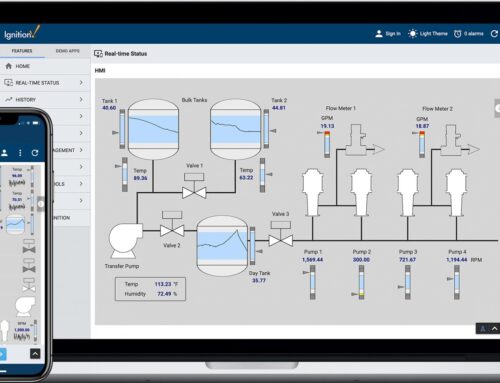How to Integrate Atlas Copco Torque Tools with MES Systems Using open Protocol
In today’s fast-paced manufacturing surroundings, organizations are constantly looking for innovative ways to enhance production efficiency, improve quality control, and ensure traceability. one of the pivotal elements in achieving these goals is the seamless integration of torque tools with manufacturing Execution Systems (MES). With the increasing complexity of manufacturing operations, particularly in industries such as automotive and aerospace, effective interaction between torque devices and your MES becomes essential.
Why Integrate Atlas Copco Torque Tools with MES?
Integrating Atlas Copco torque tools through the Open Protocol standard allows manufacturers to harness the full potential of their equipment and optimize their production processes. Here’s why this integration is critical:
- Improved Traceability: Ensure that every joint tightened with torque tools can be traced back to specific production batches, enhancing accountability and compliance with industry standards.
- Error-Proofing Operations: By leveraging real-time data from torque tools,manufacturers can minimize human errors,ensuring that every tightening operation meets predefined specifications.
- Tightening Validation: Automatic validation of tightening processes ensures that implemented torque values are adhered to, helping to eliminate reworks and reduce warranty claims.
- Real-Time Data Collection: Instant access to performance data allows for quick decision-making, identifying potential issues before they escalate into larger production problems.
This article delves into the technical aspects and step-by-step guidance on how to effectively integrate Atlas Copco torque tools with MES systems using the Open Protocol.
Key Takeaways:
- Understand the foundational concepts of Open Protocol and its benefits.
- Explore the communication flows between Torque devices and MES platforms.
- Learn how to set up and configure the Innorobix OpenProtocol module to support two-way communication.
- Consider case studies demonstrating accomplished integrations and their impacts on operational efficiency.
By the end of this article, you will gain the insights and knowledge necessary to implement robust integrations that enhance your manufacturing processes and drive quality improvement across the board. Let’s get started on this journey towards optimized production!
Understanding Open Protocol: The Backbone of Effective Torque tool Integration
Open Protocol technology fundamentally transforms the way torque tools communicate with Manufacturing Execution Systems (MES) and other enterprise systems. By enabling a bi-directional link between devices like Atlas Copco torque tools and your MES, Open Protocol allows for seamless data exchange. This integration facilitates real-time monitoring and error-proofing capabilities that significantly enhance traceability and quality control processes in manufacturing environments. For instance, manufacturers can configure their Atlas Copco tools to directly feed real-time tightening data to their MES. This continuous stream of information enables instant validation of tightening results, ensuring that every joint meets the required specifications. Such an approach not only reduces human error but also ensures that historical data is available for audits, thereby improving compliance with industry standards.
The operational benefits of integrating torque tools with Open Protocol are profound.Manufacturers can expect:
- Immediate feedback loops: The system can alert operators if a tool is not functioning within predefined tolerances, allowing for corrective action to be taken before defects occur.
- Built-in tightening validation: Automated checks ensure that the proper torque has been applied, further contributing to product reliability and safety.
- enhanced data collection: Real-time analytics provide insights into operational efficiency and highlight opportunities for continuous improvement.
By harnessing this technology, organizations can maintain a competitive edge while ensuring that their products meet the highest quality standards.
Enhancing Quality Control: Real-Time Data Collection for Improved Traceability
Integrating Atlas Copco torque tools with MES systems via the Innorobix Open Protocol module provides manufacturers with a robust platform for real-time data collection, significantly enhancing their quality control processes. By facilitating a seamless two-way communication between the torque devices and the MES, manufacturers can automatically capture critical information during assembly operations. As an example, consider an automotive manufacturer using Atlas Copco’s tools on an assembly line.By configuring the Open Protocol to log torque values,tightening cycles,and error notifications,the MES can maintain an up-to-date record of each fastening operation. This real-time data allows for immediate identification of anomalies, such as a torque value falling outside specified limits, thereby enabling immediate corrective actions.
Furthermore,the complete traceability provided by real-time data not only helps in detecting faults but also in documenting compliance with internal and external quality standards. As manufacturers face increasing scrutiny regarding product quality and safety, having instant access to tightening data becomes invaluable. For example, if an issue arises in the field, a manufacturer can quickly retrieve tightening data associated with particular assemblies to verify compliance with design specifications. Key benefits of implementing real-time data collection through Open Protocol include:
- Enhanced Traceability: Capture and log all torque measurements, ensuring every assembly is documented.
- error Proofing: Real-time feedback allows operators to correct issues before they escalate,reducing rework and scrap.
- Tightening Validation: Ensure all tightening processes meet predefined quality standards, supporting regulatory compliance.
- Data-Driven decisions: Utilize historical data to analyze trends and improve processes, ensuring continuous quality improvement.
Error-proofing Your Manufacturing Process: Validating tightening with Atlas Copco
Integrating Atlas Copco torque tools with your MES system using Open protocol offers robust error-proofing capabilities that enhance the overall quality of your manufacturing processes. By establishing a continuous two-way communication channel between the tools and the MES, manufacturers can ensure that every tightening operation is meticulously documented and validated in real-time.As a notable example, if a torque gun operates outside predetermined parameters—be it torque value, angle, or time—the system can immediately trigger an alert, halting production to prevent defective assemblies from proceeding down the line. This type of validation not only preserves product integrity but also significantly reduces the risks associated with manual data entry errors, which can lead to costly recalls and reputational damage.
Moreover, the incorporation of real-time data collection through Open Protocol provides manufacturers with deeper insights into their tightening processes. Take the case of an automotive assembly line where multiple Atlas Copco tools are utilized—by analyzing tightening data in real-time, production managers can identify trends or recurring issues, allowing for targeted adjustments before they escalate into systemic problems. Equip your manufacturing floor with features such as live torque feedback, automatic data logging, and comprehensive process audits, enhancing both quality control and operational efficiency. This proactive approach equips teams with the necessary capabilities to ensure consistent tightening validation,ultimately driving down costs while improving production throughput and customer satisfaction.
Best practices for Seamless Connectivity: integrating Torque Tools with MES for Optimal Performance
In today’s manufacturing landscape, connecting torque tools like Atlas Copco with your MES systems using Open Protocol significantly enhances operational efficiency and product quality. To ensure seamless connectivity, it is indeed essential to follow best practices that foster an error-proof environment. Begin by validating the compatibility between your torque tools and MES. Check for the latest firmware updates on your tools and ensure that the Open Protocol version implemented is compatible with your MES software. Engaging in a thorough pre-integration assessment can assist in identifying potential discrepancies in data formats and communication methods. Additionally, conducting regular maintenance checks on both hardware and software components can help avoid disruptions that may compromise the quality control process.
equipping your torque tools with real-time data collection capabilities greatly enhances tightness validation and traceability. Implementing a two-way communication system between your MES and torque devices via the Innorobix Open Protocol module allows for immediate feedback and corrective action when deviations occur. For instance, if a torque application falls outside the specified tolerance range, the MES can instantly communicate this anomaly back to the operator. Manufacturers can harness features such as:
- Error-proofing: Automatic alerts for over-tightening or under-tightening events.
- compliance tracking: Ensuring each assembly meets regulatory requirements by logging tightening data.
- Real-time monitoring: Tracking performance metrics of torque applications in live production environments for agile decision-making.
This strategic integration leads to improved quality assurance, reduced rework, and enhanced overall productivity on the shop floor.
Q&A
Q&A: Integrating Atlas Copco Torque Tools with MES Systems Using Open Protocol
Q1: What is Open Protocol, and why is it important for integrating torque tools like Atlas Copco with MES systems?
A1:
Open Protocol is a communication standard that allows seamless data exchange between intelligent torque tools and higher-level systems like MES (Manufacturing Execution Systems). its importance lies in:
- Interoperability: facilitating integration across different devices and platforms without proprietary constraints.
- Real-time data exchange: Ensuring timely and accurate data flow, crucial for modern manufacturing.
- Scalability: Supporting various manufacturing contexts and adapting to changing needs.
Q2: How does using Open Protocol enhance error-proofing in torque applications?
A2:
Open Protocol enhances error-proofing through:
- Tightening validation: Automatically validating torque readings against specified values before finalizing assemblies.
- Immediate feedback: Error messages or alerts can be sent back to the operator if a torque reading does not meet predefined criteria.
- Audit trails: Creating a comprehensive log of torque events that can be reviewed in case of discrepancies,ensuring accountability and traceability.
Example: If a bolt is over-torqued, the system can trigger an alert to stop the operation and prevent costly rework.
Q3: How do I set up real-time data collection from Atlas Copco tools to an MES using Open Protocol?
A3:
To establish real-time data collection:
- Establish Communication:
– Use the Innorobix Open Protocol module to bridge communication between the Atlas Copco tools and your MES.
- Configuration:
– Configure the torque tools to send data such as torque values, duration, and status indicators to the MES in real-time.
- Data mapping:
– Map the data types collected from the tools into your MES for monitoring and reporting.
- Monitoring Interface:
– Create dashboards or alerts within your MES to visualize torque data and respond to anomalies promptly.
Q4: What specific data can be integrated from Atlas Copco tools into an MES system?
A4:
Key data points to consider integrating include:
- Torque results: Actual values achieved for each fastening.
- Tool status: Whether the tool is idle, running, or faulted.
- Operator information: Linking specific operators with their respective torque results for traceability.
- Cycle times: Time taken for each fastening operation to enhance throughput analysis.
- Tool calibration data: Ensuring tools are within specification to maintain quality.
Q5: Can Open Protocol solutions improve productivity on the manufacturing floor? How?
A5:
Yes, implementing Open Protocol solutions can significantly improve productivity:
- Reduced downtime: Real-time alerts for tool faults or misalignments allow for immediate corrective action.
- Data-driven decisions: Access to historical data helps identify bottlenecks and optimize processes.
- Enhanced quality control: Continuous monitoring and validation reduce the risk of faulty assemblies, which can save time and resources.
Insight: Shifting from manual torque checks to automated data capture allows workers to focus on higher-value tasks, boosting overall productivity.
Conclusion
Integrating Atlas Copco torque tools with MES systems using Open Protocol provides a robust framework for traceability, quality control, and error-proofing in manufacturing. The two-way communication facilitated by the Innorobix OpenProtocol module sets the stage for enhanced operational excellence and data integrity in industrial automation.
In Summary
integrating Atlas Copco torque tools with MES systems using Open protocol significantly enhances manufacturing processes by ensuring robust traceability and quality control. Key takeaways from this integration include:
- Error-proofing mechanisms: Utilize Open Protocol to minimize human error and improve the consistency of tightening operations.
- Real-time Data Collection: Gain immediate insights into torque operations, enabling quicker responses to potential issues and maintaining optimal production lines.
- Tightening Validation: ensure that every tightening operation meets the predetermined specifications, reducing rework and increasing overall confidence in product integrity.
By leveraging the Innorobix OpenProtocol module, manufacturers can facilitate seamless two-way communication between their MES or ERP systems and torque devices, effectively bridging the gap between hardware and software for enhanced operational efficiency. We invite you to explore our innovative solutions or request a personalized consultation or demo to witness firsthand how your manufacturing process can benefit from this advanced technology. Together, let’s optimize your torque operations for greater precision and quality.
















